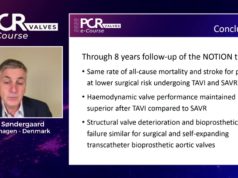
The first randomised trial comparing a course of pre-procedure percutaneous coronary intervention (PCI) versus no PCI in patients undergoing transcatheter aortic valve implantation (TAVI) with significant coronary artery disease (CAD) found no difference in the primary endpoints of death or rehospitalisation at one-year follow-up between the two treatment strategies.
Findings of the prospective, multicentre, ACTIVATION—The percutaneous coronary intervention prior to transcatheter aortic valve implantation—trial were presented by Simon Redwood (Guy’s and St Thomas’ NHS Foundation Trust, London, UK) during a late-breaking trial session at the PCR Valves e-course (22–24 November, virtual). Involving patients at 17 sites in the UK, France and Germany, the trial had a primary endpoint comparison of all-cause mortality and rehospitalisation at 12 months following TAVI.
Secondary outcome measures included mortality, major adverse cardiac and cerebrovascular events (MACCE), cerebrovascular accident (CVA), acute myocardial infarction (AMI) and hospitalisation for heart failure at 30 days and 12 moths. Repeat revascularisation, procedural success and complications, major and minor bleeding, access site complications and angina burden were also assessed.
A total of 235 patients were enrolled in the study, 119 of whom underwent PCI and 116 who did not. The study reported no difference in the primary endpoint of death and rehospitalisation at one year—41.5% in the PCI group vs. 44% in the no-PCI group (p=0.067)—meaning that the study failed to reach its 7.5% non-inferiority margin. Additionally, the study reported a higher rate of bleeding in the PCI group (44.5% vs. 28.4%, p=0.02).










